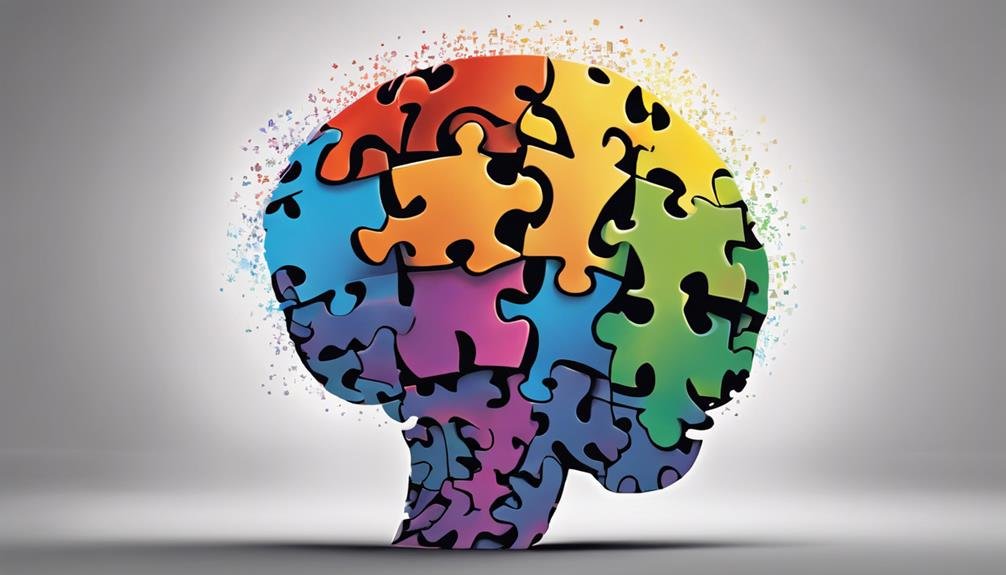Introduction to Personality and Mental Health
You may not be aware that your personality traits can greatly impact your mental health outcomes. Have you ever considered how your level of openness or conscientiousness might influence your overall well-being? Understanding these connections can provide valuable insights into your emotional resilience and cognitive processes. As we explore the intricate relationship between personality and mental health, you will uncover strategies to nurture your psychological well-being and enhance your ability to navigate life's challenges with grace and strength.
Key Takeaways
- Personality traits impact mental health outcomes and coping mechanisms.
- Emotional resilience is crucial for navigating challenges and maintaining well-being.
- Neuroticism, extraversion, openness, agreeableness, and conscientiousness influence mental health.
- Understanding personality traits aids in identifying vulnerability to mental health issues.
- Effective interventions for mental health include CBT, medication, mindfulness, exercise, and social support.
The Basics of Personality Traits
Understanding the basics of personality traits is essential for gaining insight into how individuals think, feel, and behave in various situations. Personality development is a complex interplay of genetics, environment, and experiences that shape one's unique characteristics. Trait assessment plays an important role in identifying key aspects of an individual's personality, such as openness, conscientiousness, extraversion, agreeableness, and neuroticism.
Personality disorders are characterized by enduring patterns of inner experience and behavior that deviate significantly from societal expectations. These disorders can impact how individuals interact with others, handle stress, and perceive the world around them. Behavior patterns associated with personality disorders may include impulsivity, emotional instability, detachment, or avoidance.
Understanding Emotional Resilience
To navigate life's challenges effectively, understanding emotional resilience is key. Building emotional strength equips you to cope with adversity, helping you bounce back from setbacks and maintain a positive outlook.
Learning to cultivate resilience is a powerful tool for enhancing your mental well-being and overall quality of life.
Building Emotional Strength
Developing emotional strength involves maneuvering through life's challenges with resilience and adaptability, allowing you to bounce back from difficulties stronger than before. Emotional regulation plays a pivotal role in this process. By understanding and managing your emotions effectively, you can navigate tough situations with greater ease.
Acknowledging your feelings, both positive and negative, and finding healthy ways to express them is key to building emotional resilience.
Self-care is another essential component of enhancing emotional strength. Taking time for yourself, engaging in activities that bring you joy, and prioritizing your mental well-being can greatly impact how you handle stress and adversity.
Whether it's practicing mindfulness, exercising, or spending time with loved ones, self-care routines can help replenish your emotional resources and fortify your inner strength.
Incorporating strategies like emotional regulation and self-care into your daily life can empower you to face challenges with a renewed sense of confidence and resilience. By nurturing your emotional well-being, you pave the way for a healthier and more resilient mindset.
Coping With Adversity
Moving through life's challenges with emotional resilience requires a deep understanding of how to cope with adversity effectively. Stress management plays an important role in overcoming challenges and building emotional strength.
When faced with adversity, it's imperative to practice positive thinking and employ self-care techniques to navigate difficult situations successfully.
One key aspect of coping with adversity is developing healthy stress management strategies. This involves recognizing your triggers, setting boundaries, and implementing relaxation techniques such as deep breathing or mindfulness exercises. By proactively managing stress, you can enhance your ability to cope with life's ups and downs.
In addition to stress management, cultivating a positive mindset is crucial for overcoming challenges. Positive thinking can help shift your perspective, allowing you to see obstacles as opportunities for growth and learning.
Engaging in self-care techniques like regular exercise, adequate sleep, and spending time with loved ones can also boost your resilience in the face of adversity.
Impact of Personality on Cognition
Understanding how personality traits influence cognitive processes can provide valuable insights into individual differences in mental functioning. Your unique combination of personality traits shapes how you perceive, process, and respond to information.
For example, individuals high in openness to experience tend to approach cognitive tasks with curiosity and creativity, while those high in conscientiousness may exhibit a more structured and methodical approach.
These cognitive processes influenced by personality traits can impact various aspects of your mental functioning. For instance, extraverted individuals might excel in tasks requiring social interaction and communication, whereas introverted individuals might prefer tasks that allow for deep focus and introspection.
Additionally, individuals with high levels of neuroticism may be more prone to negative thought patterns and rumination, affecting their ability to concentrate and problem-solve effectively.
Nurturing Mental Well-being
The connection between personality traits and cognitive processes also plays a significant role in nurturing mental well-being. Engaging in self-care practices and effective stress management techniques are essential components in maintaining good mental health. Taking time for yourself, whether through exercise, hobbies, or simply relaxing, can help reduce feelings of overwhelm and anxiety, promoting a sense of inner peace and balance.
Mindfulness techniques are powerful tools for achieving mental equilibrium. By practicing mindfulness, you can learn to be present in the moment, acknowledge your thoughts without judgment, and cultivate a greater awareness of your emotions.
This heightened self-awareness can lead to improved mental balance and a greater sense of overall well-being.
Exploring Inner World Complexities
Exploring the depths of your inner world reveals a tapestry of complexities waiting to be understood and explored. Starting on a self-discovery journey leads to revealing the mysteries of your emotional intelligence. Understanding your emotions and how they impact your thoughts and behaviors is essential in maneuvering life's challenges.
Inner conflicts often arise when there's a dissonance between your true self and the persona you present to the world. Developing self-awareness is a key component in unraveling these inner conflicts and fostering psychological growth.
As you dive deeper into your psyche, you may encounter aspects of yourself that are both enlightening and unsettling. Embracing these complexities with empathy and curiosity can lead to profound personal insights. Recognizing your strengths and vulnerabilities contributes to a more holistic understanding of your identity.
Cultivating emotional intelligence allows you to navigate relationships more effectively and make conscious decisions aligned with your values. Through introspection and self-reflection, you pave the way for a more authentic and fulfilling life.
Promoting Psychological Resilience
To foster psychological resilience, it's essential to cultivate adaptive coping strategies and a resilient mindset. Stress management plays a vital role in building resilience. Learning how to manage stress effectively, whether through time management techniques, relaxation exercises, or seeking social support, can help you navigate through challenging situations with more ease.
Emotional regulation is another key aspect. Being able to identify and understand your emotions, as well as finding healthy ways to express them, can enhance your resilience in the face of adversity.
Self-care is fundamental in promoting psychological resilience. Engaging in activities that bring you joy and relaxation, prioritizing sleep, nutrition, and exercise, and setting boundaries to protect your mental well-being are all part of self-care practices that can strengthen your resilience.
Mindfulness practices, such as meditation and deep breathing exercises, can help you stay grounded and present in the moment, fostering a resilient mindset that can weather life's storms more effectively.
Conclusion
As you reflect on the intricate dance between personality traits and mental health, remember that understanding yourself is a journey of self-discovery and growth.
Just as a painting is shaped by every brushstroke, your thoughts, emotions, and behaviors are influenced by the unique blend of traits that make you who you are.
Embrace the complexities of your inner world like a tapestry of colors, weaving together to create a masterpiece of resilience and well-being.







